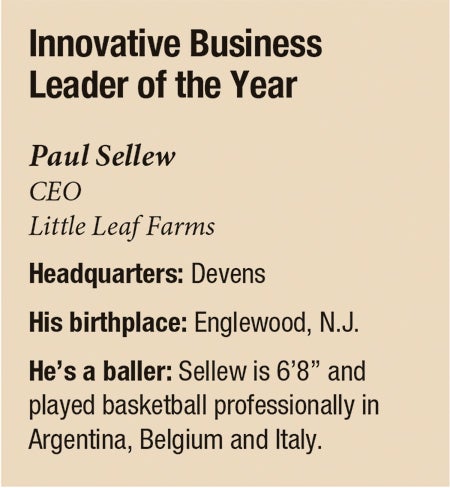In a short time, Paul Sellew has proven lettuce can be grown year-round in Devens, despite cold winters. He’s shown lettuce can be grown without any soil, with a fraction of the water it would normally need, and with little human interaction.

Now, Sellew and his hydroponics company, Little Leaf Farms, is out to show it can be done again and again.
Little Leaf Farms, which opened in 2016, has significantly expanded its greenhouse, which can be found down a quiet residential street off Walker Street on the northern edge of the old military base. In January, the company announced it will add two more greenhouses, each spanning 20 acres, in North Carolina and Pennsylvania to allow its produce to make its way onto grocery shelves across a broader swath of the Northeast and into the Mid-Atlantic.
Those will add to its Devens greenhouse, which has produced lettuce and arugula to more than 1,000 grocery stores, colleges and school districts.
Sellew, Little Leaf’s CEO and co-founder, wasn’t new to farming.
His family operated and still runs Prides Corner Farms, a wholesale ornamental plant nursery spanning more than 350 acres in Lebanon, Conn. To that experience, Sellew added advanced technologies to make leafy greens supplied quickly to millions of households.
“People love the product,” Sellew said. “We’re up against the West Coast product that’s shipped across the country, and we’re able to win on quality, taste and freshness.”
Sellew started Little Leaf having already found success as the founder of Backyard Farms, a grower and distributor of greenhouse-grown tomatoes in Maine, and Harvest Power, which he says grew into the largest organics recycler in North America.
Since opening, Little Leaf has expanded its Devens facility from 2.5 acres to five and then 10. Now, with 60 employees running two shifts a day seven days a week, it produces 1 million boxes of greenhouse-grown baby green lettuce monthly for every major supermarket chain in New England, within 24 hours.
Little Leaf has done it all in a climate otherwise making growing lettuce year-round impossible. The location is an attribute, said Neil Mattson, an agriculture professor at Cornell University.
The Devens location is near enough to Boston and other Northeastern cities to ship quickly, Mattson said. But a more rural spot makes land costs cheaper. And the latitude and climate is better suited to a greenhouse than, say, the Southeast, where temperatures would get too high, or California, where farmers often run into water shortages.
Today, virtually all traditionally grown lettuce comes from Arizona and California, according to the U.S. Department of Agriculture.
“Our climate is a bit challenging, but we’re close to the population centers,” Mattson said.
A few other things work in Little Leaf’s favor. Because it’s only indoors, it doesn’t use pesticides, herbicides or fungicides. It doesn’t have the same contamination concerns from animals or nearby untreated water. Its growth has come as consumers tend to pay more attention to how near, or far, what they’re eating was grown or made.
“We’re at the beginning of a food transformation, and what’s driving that is advances in technology,” Sellew said. “That’s what Little Leaf is doing.”
It’s easier said than done. The industry is costly to enter because of equipment and technology costs, Mattson said, and lenders are looking for experienced operators.
Mattson has gotten to know Sellew because the Little Leaf owner has hired a few Cornell graduates and is an alumnus himself. On visits to Little Leaf, Matton said he was impressed by an advanced automated technology system. The greenhouse uses 90% less water than a typical farm with its productivity while yielding 25 times more crops per acre than a farm normally would.
Tens of thousands of narrow trays hold lettuce and arugula growing in a fully automated process taking about three and a half weeks. The trays are filled with a mineral product substituting for soil, and tubes running underneath carry fertilizer and irrigation from rain on the greenhouse roof.
The trays move along the length of the greenhouse until a machine pushes them into a room to be chopped, washed and packaged. Outside, a growing season for lettuce might last 10 to 12 weeks. Inside, it’s year-round.
“I think of it as among the most advanced greenhouses in the U.S.,” Mattson said. “Paul obviously really gets it.”
Read about the other 2020 Business Leaders of the Year
Small Business Leader of the Year: Brandale D. Randolph, founder & CEO, 1854 Cycling Co.
Large Business Leader of the Year: Harry Kokkinis, president, Table Talk Pies, Inc.
Nonprofit Business Leader of the Year: Stephanie Page, executive director, Abby’s House
Family Business Leaders of the Year: Edna, Gregory & Miriam Hyder, co-owners, Ed Hyder’s Mediterranean Marketplace

